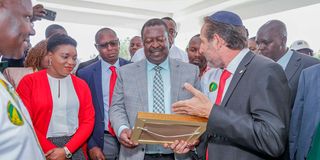Musalia Mudavadi wants State run like private firms

Prime Cabinet Secretary Musalia Mudavadi (centre) during the World TB Day in Eldoret on March 24. On the left is Health Cabinet Secretary Nakhumicha Wafula.
Kenyans should expect drastic changes in public services if targets set by Prime Cabinet Secretary Musalia Mudavadi for state agencies are met.
In what is likely to give the government a feel of private organisations, Mr Mudavadi wants every state office to display charts indicating services offered, time taken to offer them plus the costs involved.
He also wants the offices to have performance contracts and quarterly appraisals for every employee, tightened job descriptions and daily assignments.
Government workers may soon find themselves shifted across ministries as Mr Mudavadi wants an audit of roles vis-a-vis staffing.
There should also be transfers in an effort “to harmonise deficits and surpluses within and between ministries, departments and agencies”.
In addition to these, payroll audits and the weeding out of ghost workers are on the way.
Heads of state agencies have been told to put in writing how they will cut costs in line with the government policy.
Obsolete assets
The heads are also required to take stock of the strengths, weaknesses, opportunities and threats their agencies face; show how they can dispose of obsolete assets and explain how remuneration for staff can be made competitive.
Mr Mudavadi has recommended that some of these changes be implemented in the Judiciary, Legislature and devolved governments too.
“The three arms of government are organically intertwined though functionally differentiated,” he says in a conglomerate of eight circulars issued to Principal Secretaries, State House Comptroller, chiefs of staff in the Deputy President and Prime Cabinet Secretary’s office, clerks of the National Assembly and Senate, Judiciary Chief Registrar, Solicitor-General and the Council of Governors Chief Executive.
Most circulars in the document titled “Circular Letter No.1 of 2023”, issued on March 22, give PSs and other officials up to April 10 to compile reports regarding departments under them and submit the documents to Mr Mudavadi’s office.
A copy was sent to the Head of Public Service.
Mr Mudavadi says some requirements stem from the January Cabinet retreat in Nanyuki that was chaired by President William Ruto.
Dr Ruto set out a workplan for ministries and state departments during the retreat.
The Prime CS also cites President Ruto’s Executive Order No.1 of 2023 that set out the roles of state agencies.
Among the areas Mr Mudavadi wants reports done is the core competencies of employees.
He wants a confirmation that workers understand their daily assignments and output as specified in job descriptions, schedule of duty and workplans.
Mr Mudavadi wants payroll audits and cleansing guided by the authorised establishment in close consultation with the state department responsible for public service.
Mottos common in private firms will also find a way into government offices.
One of those is “Nobody is Left Behind” and another is “Whole of Government Approach”.
The former refers to methods of managing staff while the latter aims at inspiring a spirit of cooperation between the three arms of government.
Mr Mudavadi wants service charters revised. They should be stated in English, Kiswahili, vernacular languages and in digital format.
“As we embark on the analysis of mandates and core functions, the people of Kenya have high expectation on professional delivery of goods and services in an efficient, effective and ethical manner,” he says.
“One of the most effective contractual instruments that guarantees professional and predictable services to the citizenry and other stakeholders is the service charter.”
He adds that manual service charters should be well displayed on public notice boards.
The Prime CS wants existing service charters updated and digitised for national and county government functions.
Such charters, he says, should of necessity target popular services, “including areas most prone to corruption and unethical conduct”.
“It is expected that the Legislature and the Judiciary shall develop their service charters. County governments will be engaged separately to ensure harmony and synergy of purpose,” he says in the document.
One of the circulars touches on cost-cutting.
Mr Mudavadi wants targeted officials to submit reports that explain “stringent measures that will cut spending on non-critical areas”.
Among the areas he wants analysed is whether some government functions can be “best performed by the private sector”.
Mr Mudavadi says one-stop shops in the mould of Huduma centres be strengthened and that seminars and other functions be held in government institutions as much as possible.
He wants state agency chiefs to illustrate how they will reduce unnecessary travel and the size of delegations.
The cost-cutting will also entail digitising procurement and streamlining state purchases.
In all, he wants an “enhancement of the saving culture, financial discipline and prudent style of management”.
In an Executive order last year, Dr Ruto assigned Mr Mudavadi the role of managing the performance of public service and made him the head of the Government Delivery Unit.





